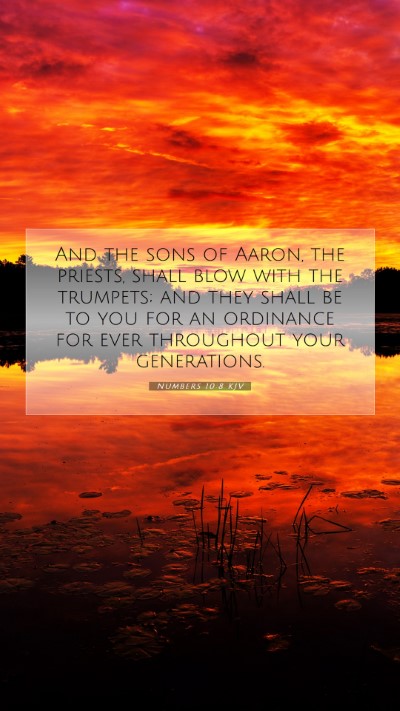Understanding Numbers 10:8
In Numbers 10:8, the scripture states: "And the sons of Aaron, the priests, shall blow with the trumpets; and they shall be to you for an ordinance forever throughout your generations." This verse holds significant meaning as it establishes the role of the priesthood during important gatherings and events in Israelite history.
Overview of Scripture Interpretation
To understand this verse deeply, we must consider its context within the broader narrative of the Book of Numbers. The blowing of trumpets by the sons of Aaron not only signifies a call to assembly but serves as a divine ordinance, reminding the Israelites of their covenant relationship with God.
Bible Verse Meanings
- The Role of the Priests: The priests, descendants of Aaron, were designated to carry out specific rituals and duties. Their act of blowing the trumpets symbolizes leadership and authority in worship.
- Covenant Significance: The phrase "for an ordinance forever" emphasizes the enduring nature of these practices, signifying how the acts of worship are vital for maintaining a connection with God across generations.
- Call to Action: The sound of the trumpets would rally the people, illustrating the importance of unity and readiness among the Israelites as they journey through the wilderness.
Bible Verse Interpretations
Commentaries reveal several layers to explore:
- Matthew Henry's Commentary: Henry emphasizes the importance of ceremony in worship and how trumpets served as instruments to call people to prayer, remembrance, and action.
- Albert Barnes' Notes: Barnes highlights the practical implications of the trumpet's sound in military and religious contexts, underscoring its role in both chaos and order.
- Adam Clarke's Commentary: Clarke sheds light on the historical context, explaining that these rituals would mark significant occasions, including religious festivals and battles.
Biblical Exegesis and Context
In the backdrop of Numbers, the significance of trumpets becomes evident as the Israelites prepare to enter the Promised Land. Their function transcends mere announcements; they represent divine authority and guidance.
Meaning of the Verse in Daily Life
For modern readers, understanding Numbers 10:8 offers practical insights:
- Leadership in Worship: Just as the priests blew the trumpets to guide the assembly, spiritual leaders today play a similar role in guiding their communities in worship and faith.
- The Importance of Remembrance: The acts of remembrance through rituals can foster community spirit and maintain a focus on spiritual growth.
- Unity and Readiness: The call to come together can inspire believers to be prepared for collective worship, prayer, and action in faith.
Scripture Analysis and Cross References
Numbers 10:8 connects with several other scriptural references that reinforce its themes:
- Leviticus 23:24: This verse discusses the blowing of trumpets during the Feast of Trumpets, underscoring the ritual's significance.
- 1 Corinthians 14:8: Paul speaks about the importance of clarity in sound when calling people, paralleling the need for clarity and purpose in worship.
- Joshua 6:4: The account of the fall of Jericho emphasizes the strategic use of trumpets in biblical history.
Conclusion
Numbers 10:8 provides a rich insight into the significance of priestly duties and communal worship in ancient Israel. As readers delve into this verse, they harness a greater understanding of God's expectations for His people and the enduring power of worship through symbols such as the trumpet.
For those interested in conducting Bible studies, this verse serves as an excellent topic. It can spark discussions on the roles of leadership, the significance of ceremonies, and the ways in which God's commands have historical and practical applications in today's world.


